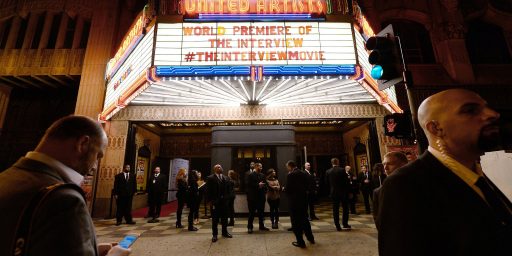Estate of William Faulkner sues for damages over 9 words
Lighting strikes twice in this case. Not only did a court get a fair use decision correct, but when you read the details, you’ll find yourself siding with a major motion picture company. From the Hollywood Reporter:
A federal judge in Mississippi declared victory on Thursday for Sony Pictures in a lawsuit brought by the owners of the rights to the literary works of the late William Faulkner.
The lawsuit contended that the film distributor violated Faulkner’s copyright and the Lanham Act by allowing a character in Woody Allen’s Midnight in Paris to quote a passage from Faulkner’s Requiem for a Nun.
Sony argued that the use was de minimis and a “fair use.”
[…]
Midnight in Paris features a protagonist played by Owen Wilson who travels to Paris and finds himself spending time with literary greats including F. Scott Fitzgerald, Ernest Hemingway and Gertrude Stein.
In the film, Wilson describes his fantastic experiences. He says, “The past is not dead! Actually, it’s not even past. You know who said that? Faulkner. And he was right. And I met him, too. I ran into him at a dinner party.”
In Requiem for a Nun, Faulkner wrote, “The past is never dead. It’s not even past.”
[…]
In terms of the purpose and character of the use, the judge notes “the copyrighted work is a serious piece of literature lifted for use in a speaking part in a movie comedy, as opposed to a printed portion of a novel printed in a newspaper, or a song’s melody sampled in another song. This transmogrification in medium tips this factor in favor of transformative, and thus, fair use.”
As for the substantiality of the portion used in relation to the copyrighted work, the Faulkner literary estate attempted to argue that the “Quote describes the essence of Requiem,” and as such deserved some extra credit for its qualitative importance.
But the judge responds, “Qualitative importance to society of a nine-word quote is not the same as qualitative importance to the originating work as a whole. Moreover, it should go without saying that the quote at issue is of miniscule quantitative importance to the work as a whole. Thus, the court considers both the qualitative and quantitative analyses to tip in favor of fair use.”
As a lay person, what seems particularly egregious about this case is that Woody Allen, the film’s writer and director, actually “cited” Faulkner, crediting him with the words. Further, the quote is actually a paraphrase.
What’s especially baffling is what the Faulkner estate hoped to accomplish in such a suit. Given how frivolous it was, it doesn’t exactly make them look particularly good. As for whether or not the use of the quote in the movie hurt their investment, I think the judge got it right:
Judge Mills is also doubtful that the market for Faulkner’s work is going to be harmed by Midnight in Paris, and in fact theorizes that is more likely “the film indeed helped the plaintiff and the market value of Requiem if it had any effect at all.”
Indeed.





I’d write something, but the words would probably paraphrase something in a Tom Clancy novel (still quite under copyright).
The late Robert B. Parker used to quote Faulkner–and word-for-word–in some of his own Spenser novels, and never ran into a problem. Maybe those in charge of Faulkner’s estate never knew about it.
Copyright is never dead. It’s not even past.
Immature poets imitate; mature poets steal. — T.S. Eliot
It’s actually a clever strategy on the part of the Faulkner estate, banking that a judge wouldn’t be willing to sit down and watch any post-Annie Hall Woody Allen movie in order to make a fair ruling. I’d rather review the evidence for the Tupelo Face-eater murder trial than watch most of them.
@PD Shaw:
Apparently it was Elliot (or Wilde) who wrote that, but one Philip Massanger:
Elliot apparently wrote an essay on Massagner and that’s where the confusion took place. It’s like how one of the famous sayings of Max Weber was actually created by the anthropologist Clifford Geertz:
@Pinky:
Aw come on… At least draw the line a mid-ninety’s Woody Allen (Manhattan Murder Mystery). And if you haven’t seen “The Sweet and Low Down” (and you like gypsy jazz) you’re missing a wonderful comedy.
But beyond that, while people can bitch about late Allen (or his personal issues), the fact is it’s hard to find such a prolific filmmaker/writer. Just look at his output:
http://www.imdb.com/name/nm0000095/
@Matt Bernius: Hah, I think my quote on artistic theft is even more poignant now that I know it was borrowed. Very meta.
@PD Shaw:
I somehow thought you’d appreciate it.
There’s another quote floating around about how a real artist “steals with brilliance.” Still trying to track down who that came from.
Thank you, btw, for giving me the nudge to track down the complete Messanger quote which is quite wonderful and well worth thinking about.
So when I
quoteparaphrasepolish Woody’s line from Annie Hall andexclaimejaculate “Masterbation is sex with someone I love.”I don’t have to worry about the process server
poundingbeating on my door.(My thesaurus is a
user-friendlyhandy tool!)I wrote the word “indeed” on the back of a napkin the other night. Matt, I’m afraid you’ve violated copyright law and the Lanham act. You will hear from my attorney.
@Matt Bernius: Horses are prolific, but I don’t want to step in their output.
@Pinky:
Touche. (And thanks for that particular adage!)
Though I can think of a lot of other “prolific” folks in the entertainment industry who I’d stage an intervention with well before Allen.
@JWH: The folks at Stargate SG-1 might have claims against the both of you!
@Timothy Watson: And the folks at WWE might have claims against both of us!
Probably employed the law firm of Snopes, Snopes, Snopes, and McCormick.